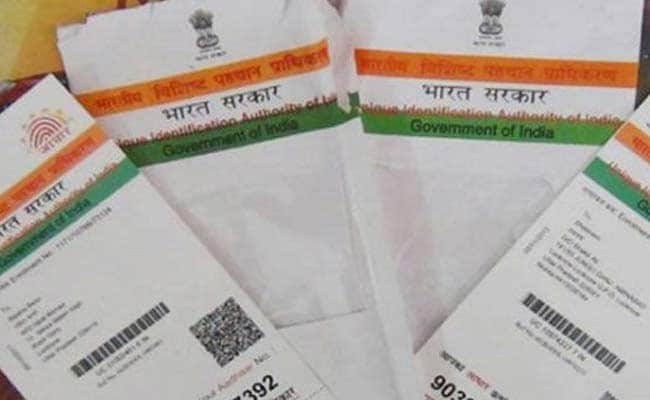
Attorney General Mukul Rohatgi defended Centre's move to make Aadhaar mandatory for PAN cards.
NEW DELHI:
The government has the power to make Aadhaar, the 12-digit unique identification number, mandatory for PAN cards under the law passed by Parliament last year, the Centre's top law officer Mukul Rohatgi told the Supreme Court on Tuesday.
"The idea behind Aadhaar is to make a secure and robust system by which the identity of a person cannot be faked," Attorney General Rohatgi told the top court that is hearing three petitions challenging a change in the Income Tax law during parliament's Budget session. The hearing would resume tomorrow.
This provision mandated that people filing income tax returns would have to give their Aadhaar number too. Also, people who do not link their PAN card to their Aadhaar number would risk losing their PAN card. On Tuesday, the petitioners argued that this provision was unconstitutional and in "direct collision" with the Aadhaar Act.
Attorney General Rohatgi said the petitioners were under the impression that Aadhaar is voluntary under the law. "It is not voluntary as they say. The language is different," he said.
The top law officer's assertion puts an end to a nuanced distinction that the Unique Identification Authority of India (UIDAI) that issues the Aadhaar number had tried to make for nearly a year: that people were required to get an Aadhaar for, say to get food for children, but the food would not be denied to those who don't have the number.
Pitching Aadhaar as a tool to prevent identity fraud, the Centre also told a bench of Justices AK Sikri and Ashok Bhushan that Aadhaar was part of more robust system of identity with finger prints and iris. There hadn't been a single instance of an Aadhaar identity being duplicated in contrast to 10 lakh PAN cards that had to cancelled.
The government has also been dismissive of privacy concerns, insisting that the data is encrypted and stored in the database within the country. But it hasn't acted against departments that have put out around 130 million Aadhaar numbers in public domain for the last few months.
"The idea behind Aadhaar is to make a secure and robust system by which the identity of a person cannot be faked," Attorney General Rohatgi told the top court that is hearing three petitions challenging a change in the Income Tax law during parliament's Budget session. The hearing would resume tomorrow.
This provision mandated that people filing income tax returns would have to give their Aadhaar number too. Also, people who do not link their PAN card to their Aadhaar number would risk losing their PAN card. On Tuesday, the petitioners argued that this provision was unconstitutional and in "direct collision" with the Aadhaar Act.
Attorney General Rohatgi said the petitioners were under the impression that Aadhaar is voluntary under the law. "It is not voluntary as they say. The language is different," he said.
The top law officer's assertion puts an end to a nuanced distinction that the Unique Identification Authority of India (UIDAI) that issues the Aadhaar number had tried to make for nearly a year: that people were required to get an Aadhaar for, say to get food for children, but the food would not be denied to those who don't have the number.
Pitching Aadhaar as a tool to prevent identity fraud, the Centre also told a bench of Justices AK Sikri and Ashok Bhushan that Aadhaar was part of more robust system of identity with finger prints and iris. There hadn't been a single instance of an Aadhaar identity being duplicated in contrast to 10 lakh PAN cards that had to cancelled.
The government has also been dismissive of privacy concerns, insisting that the data is encrypted and stored in the database within the country. But it hasn't acted against departments that have put out around 130 million Aadhaar numbers in public domain for the last few months.
Track Latest News Live on NDTV.com and get news updates from India and around the world

